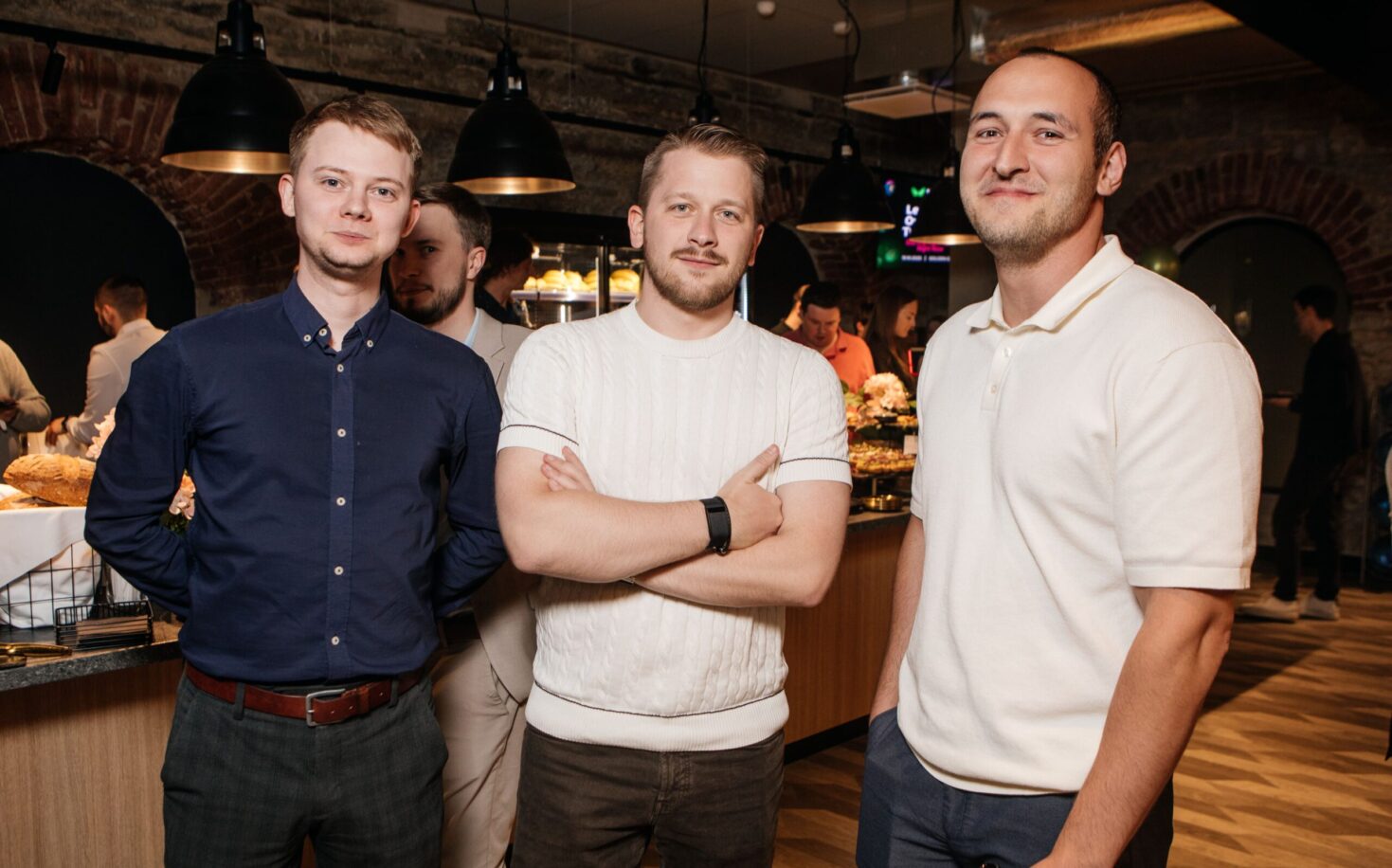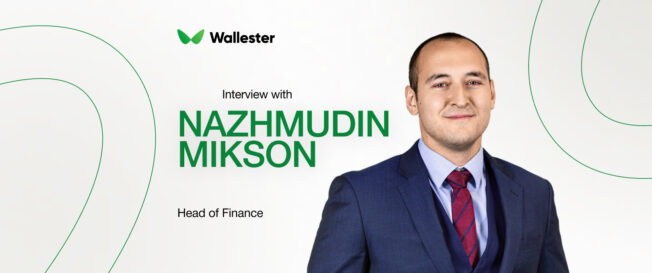In a high-growth fintech context, the finance function has become much more than balancing the books or ensuring compliance. It is now the engine room of the company – managing liquidity, forecasting growth, and, most importantly, ensuring that ambition is matched by operational resilience and financial readiness.
This, ideally, requires a leader who understands both the rigid structure of traditional auditing and the frenetic speed of modern financial markets. Luckily for Wallester, Nazhmudin Mikson, our new Head of Finance, has lived in both worlds.
Nazhmudin began his career in the disciplined environment of PwC, mastering the fundamentals of external audit and legacy financial systems. But he didn’t stay in the safe lane. He moved into the high-octane world of cryptocurrency at Coinmetro, where he spent more than seven years rising from controller to Chief Financial Officer. There, he helped build one of Europe’s most trusted exchanges, managing liquidity and operations in a market that literally never sleeps.
We sat down with Nazhmudin to discuss his journey, the lessons learned from the “wild west” of crypto, the importance of growing sustainably, and why he believes intellectual agility is the most critical skill for modern finance teams.
Interviewer: You began your career in audit at PwC before moving into the crypto industry. That is a massive shift. How did those two very different worlds shape the way you think about finance today?
Nazhmudin: It was definitely a contrast. PwC was a legacy environment that was highly regulated and structured. It was about working with well-established customers. The main lesson? It gave me a strong foundation in statutory responsibilities and the ability to see the “larger picture” of how businesses operate.
Then I moved to crypto, which at the time was the absolute “wild west.” It was an early-stage company funded by an ICO (Initial Coin Offering, an unregulated fundraising mechanism similar to an IPO, but for cryptocurrency projects). It was about operating in a space with almost no regulation and very vague reporting requirements.
The biggest difference wasn’t just the speed. In the early crypto days, many competitors had questionable products and failed quickly. What I learned is that while audit teaches you rules, an unregulated environment teaches you survival. It forces you to build your own frameworks when none exist. Bringing those two perspectives together – the discipline of audit and the adaptability of crypto – is how I approach finance now.
Interviewer: What made Wallester the right move at this point in your career?
Nazhmudin: It was a personal decision driven by a need for a new challenge. I wanted an environment that would stimulate growth, but with a more grounded business model. I had heard only positive feedback about Wallester here in Tallinn, so when I saw the opening, it just felt right.
Wallester sits in a unique spot. It’s not a legacy bank, but it’s not a volatile crypto project either. It’s a serious infrastructure provider.

Interviewer: In your first months as Head of Finance, what have been your main priorities inside Wallester?
Nazhmudin: Regardless of the operational tasks, my number-one task is always to understand the team and the stakeholders. You cannot achieve results if you don’t know the people driving them.
Operationally, I’m currently focused on specific efficiencies like improving our deposit solutions for certain currencies and collaborating with both the tech and finance departments to streamline our accounting processes. When you grow as fast as Wallester, your internal processes need to evolve constantly to keep up.
Interviewer: You’ve led finance operations in high-pressure environments before. What do you consider essential for a finance team in a fast-growing fintech?
Nazhmudin: Our finance team is currently six people. For a group this size in an environment that always keeps evolving, I’d say the most critical quality is intellectual agility.
Things change rapidly in this business. The economic environment shifts, regulations update, and business needs pivot. You need resilience and a positive attitude to handle that. If you get stuck in rigid ways of thinking, you fall behind. You need to be able to digest new information and adapt your game plan immediately.
Interviewer: Coming from years in crypto, are there lessons you can carry over directly into payments and infrastructure?
Nazhmudin: Crypto is a much higher-risk industry compared to what we do at Wallester, but the lessons on risk management are universal.
The biggest takeaway is: “Do your own research.” Never take words for granted. In crypto, high-risk service providers – even banks – can fail overnight. We saw that with several institutions servicing the sector.
The lesson is that you must assume risks exist and have a game plan for them. You can never rely on just one partner or one solution. Diversification and deep due diligence are the only ways to survive long-term.
Interviewer: You mentioned shifts in the economic environment. With uncertainty around interest rates, valuations, and the wider tech cycle, how do you think this macro environment is shaping fintech strategy going into 2026?
Nazhmudin: We are seeing a shift. Venture capital has become much more selective. It looks like the era of “growth at all costs” is fading.
Investors today value long-term business sustainability over huge, expensive growth spikes. For example, we see commodities like gold reaching all-time highs, which suggests trust in the broader economy is decreasing, and people are moving toward conservative assets.
For fintechs, this means the priority must be sustainability. We need to stay relevant and adaptable, but we must build a business that makes sense fundamentally, not just one that burns cash to acquire users.
Interviewer: When you say “sustainability” in a high-growth context, what does that actually look like?
Nazhmudin: It means prioritising the basics: real-time financial visibility, multi-jurisdictional compliance, and efficient money management – especially liquidity and treasury.
But fundamentally, the driver of sustainability is people.
Interviewer: Yes, we often talk about Wallester being faster and more agile than traditional banks. But that alone wouldn’t be enough.
Nazhmudin: The real driver is the people. For our products – whether it’s Wallester Business or our White-Label solution – our edge lies in offering innovations and growth. It’s much more than just card-issuing. But that speed is only possible because of the team behind it.
It starts from the very top, with management who deeply understand market dynamics, and extends to every employee delivering high-quality work. Everyone is “into it,” at every level. When you have a team that is both passionate and aligned on the mission, that is where the real agility comes from.
Interviewer: Outside of work, what keeps you balanced?
Nazhmudin: Honestly, I don’t often feel the need to “discharge” from work because I genuinely enjoy what I do and I’m happy where I am. Still, balance is important. For me, it’s about spending time with my family, travelling on weekends, and engaging in sports when possible. It keeps the perspective fresh.
Interviewer: And finally – if you could give one piece of advice to yourself on your first day in finance, what would it be?
Nazhmudin: Embrace ownership. Don’t just do the task; take responsibility for the outcome. That is the only way to do things quicker and better. Also, maintain your thought independence, show integrity, and always seek to broaden your knowledge.


